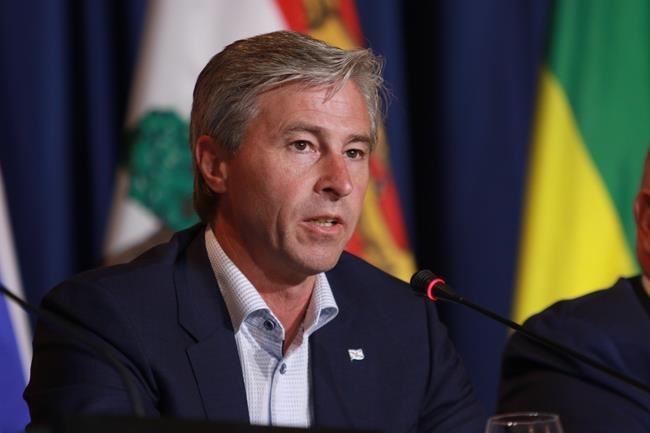HALIFAX — Nova Scotia’s premier says he agrees that work is needed to restore trust in the province’s health-care system after the recent deaths of two patients who had waited hours for care in hospital emergency departments.
Tim Houston responded Tuesday to questions from reporters following what the government called a “health summit” of leaders in the province’s heath-care sector.
“Everyone working in health care is doing the best they can but everyone wants to do better," Houston said.
The afternoon meeting in Halifax involved representatives from regulatory colleges, professional associations, universities, unions and service providers.
It followed more than a week of negative publicity surrounding the deaths of 37-year-old Allison Holthoff, who waited seven hours for treatment at the Cumberland Regional Health Centre in Amherst, N.S., on Dec. 31, and of 67-year-old Charlene Snow, who left the Cape Breton Regional Hospital ER on Dec. 30 after giving up on seeing a doctor about flu-like symptoms and jaw pain.
Houston gave no specific details but said the talks focused on things that can be done to help the system in the short, medium and long term. He said there was a lot of discussion about the scope of practice for professions such as pharmacists and physiotherapists in order to take some pressure off hospital emergency rooms.
Pharmacists, in particular, have been asking for public funding to help them prescribe treatment for a number of minor ailments for which they currently charge a fee. The idea is that more people would take advantage of their services if they didn’t pay out of pocket.
Houston said it’s an idea the government is looking at. “There’s no time for turf wars anymore … we have to expand the scope of practice, and what I heard is a willingness to do that.”
Houston said the government would announce a plan on Wednesday to improve care in emergency departments, which have been hindered by overcrowding and staff shortages.
Liberal health critic Brendan Maguire said the meeting was simply another example of a government that reacts rather than plans for situations that develop within the health-care system.
“We just don’t get details from this government,” Maguire said. “They’ve said they are solutionists … but we’ve had a year and a half and we are worse off today.”
NDP Leader Claudia Chender said the recent problems in hospital ERs are really nothing new.
“I find it disingenuous that we are suddenly having a summit and announcements when these are all well-recognized issues,” Chender said. “This crisis didn’t develop overnight and it’s not going to be fixed overnight.”
The torrent of bad news has been particularly stinging for the Progressive Conservative government, which swept to power in the August 2021 provincial election on a platform almost exclusively centred on fixing the health-care system.
This report by The Canadian Press was first published Jan. 17, 2023.
Keith Doucette, The Canadian Press



